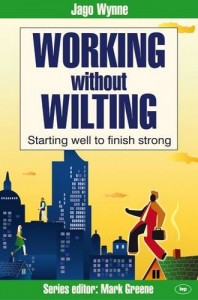 Working without Wilting:
Working without Wilting:
Starting well to finish strong
by Jago Wynne
Inter-Varsity Press, 2009
Paperback, 192 pages, £8.99
ISBN: 978-1-84474-372-8
Work matters hugely declares Mark Greene in his introduction to this book (p9). Working without Wilting is one of a series on faith and work published by IVP for the London Institute for Contemporary Christianity. Two volumes published already are Get a Life by Paul Valler (reviewed in FiBQ12:2) and Working it Out by Ian Coffey. Working Models for our Time has been commissioned from Mark Greene who has edited the whole series.
In his words, the Faith at Work series is ‘designed to .. take on the tough issues facing workers and offer material that’s fresh, either because it brings new insights to familiar topics or because the author’s particular background and experience open up enlightening vistas’ (p 10). With this in mind, each book is written in short, digestible sections which allow for easy reading on the train or during a lunch break.
Jago Wynne is well-placed to write on this subject having served as Workplace Minister at All Souls, Langham Place in London for five years prior to studying theology at Wycliffe Hall in Oxford. He has also tasted the contemporary world of work outside the church as a management consultant with Accenture. In the words of Ken Costa, Chairman of Lazard International who writes a preface to the book, Wynne is ‘a pastor mapping out a biblical view that will enable our daily lives to flourish as we see our work as part of our worship’ (p14).
It is in the conclusion that Wynne makes reference to one of the fundamental aspects of work as ordained by God in his creation of the world and of humanity. Work is a source of satisfaction but it is not the ultimate source of satisfaction which is about ‘rest in your heart as you come into relationship with the Lord Jesus Christ. It’s the same in the creation account. The Lord God rested from his work when he had brought humans into the rest of being in relationship with him.’ (p 194-5). As humans fell out of relationship with God in Genesis 3 and were banished from Eden, so the character of work which had been ordained within the garden changed. It now has the potential to frustrate as much as it has the potential to fulfil. It is not until the new creation that work will be purified and redeemed and will involve the work of serving the Lord Jesus Christ himself.
As we consider work now, therefore, Wynne reminds us that we are commanded by God to work, there is satisfaction to be had in our work, we are serving the Lord in and through our work and our work is not just temporary and earthly but has an eternal dimension to it (p198). In addition to this, ‘people matter most to God’, made in his image and brought back into perfect rest with Himself through the Lord Jesus Christ, ‘… and so people should matter most to us too’ (p199).

Working like a trout
Presented in four parts, Wynne covers work as a ‘treadmill’ examining the long-term view of working life for most people; work as a ‘trampoline’ looking at the ‘highs and lows’ or ‘ups and downs’ of working life; working like a ‘trout’ or how to display Christ-like attitudes and actions at work in the areas of character, relationships, money and stress; and finally working like a ‘trumpet’ in terms of flourishing for God through glorifying, serving and worshipping God at work.
The structure of the book is helped enormously in that each short section is followed by a ‘Recap’ presented in diagrammatic form and a section called ‘Relate’ in which the experience of real Christian workers is presented in their own words. Each section finishes with a series of three questions designed to help the reader think and pray through the lessons and implications of each section for themselves in a personal and direct way. In the light of Wynne’s own honesty about the ups and downs of his journey through the world of work, this structure works in a compelling way to help the reader engage with the issues. The gifts of the management consultant come to the fore as he works through different aspects patiently one at a time. A quick example relating to stress. Wynne encourages us to see the intellectual dimension ‘worry is a waste of time’, the emotional dimension ‘savour God’s greatness and your great value to him and the practical dimension ‘switch to focusing on the things that matter most’ (p146).
It is through this ruthlessly practical approach that we can rejoice with the example of Colin Paterson, Entertainment Reporter for BBC radio: ‘So as I stand on a red carpet with microphone in hand, I console myself with the knowledge that yes, God may not be that interested in who has won ‘Best Soap Villain’ at the TV Choice Awards, but for that night the most mundane celebrity bash in town is to be my place of worship’. To what extent are we living ‘Christianly’ in the job we do (p183)? Is our workplace worship biblecentred, loving, dependent and outwardlooking (p188)? All important questions for every worker to ask of themselves.
In the final section of the book, Wynne comments that ‘eternity has a very real, physical dimension to it’ (p197). Work will be a part of the new creation. In the light of this, there is little in his book which addresses the fruit of work which for many is a tangible product. What are the biblical implications for producing ‘things’ in the corrupted world in which we live now before Christ comes again and in which things decay and perish? What are the implications for what we produce now in the light of life in the eternal City which is promised in Revelation? In what ways do we see Christ’s redeeming work active now in manual work and the physical products which are the fruit of so many of the world’s workers? All questions which address the process of work for those working physically in production and manufacturing.
Throughout the book, Wynne deftly applies biblical passages to the points he is making. These help the reader to make direct connections between the life we live in the 21st century with the words Jesus himself first spoke over 2000 years ago within a very different social and economic context. The universal application of his words in all their challenge and comfort comes through powerfully. I recommend this book to Christians asking deep and serious questions about their work in whatever field they find God has placed them for his glory.